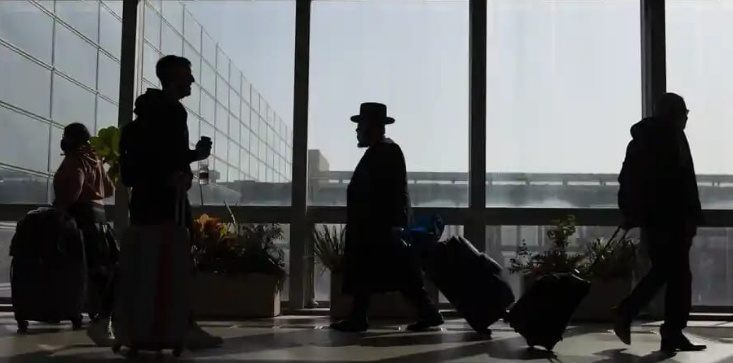Israel is barring entry to all foreign nationals as countries around the world tighten controls against the new Omicron strain of coronavirus that it is feared may render vaccines less effective.
In the world’s most far-reaching effort to keep the Omicron variant at bay, Israel’s coronavirus cabinet has authorised a series of measures including banning entry by foreigners, red-listing travel to 50 African countries, and making quarantine mandatory for all Israelis arriving from abroad.
Many countries, including Brazil, Canada, the European Union, Iran and the US, have placed restrictions on various southern African countries over the past couple of days in response to warnings over the transmissibility of the new variant. Some scientists fear Omicron will be more likely to infect, or reinfect, people who have immunity to earlier variants.
The Dutch public health authority confirmed on Sunday that 13 people who arrived on flights from South Africa on Friday had so far tested positive for the Omicron strain. Health minister Hugo de Jonge has not ruled out further measures depending on the seriousness of the new variant, adding it was “not unlikely” that more Omicron cases will appear in the Netherlands. “This could possibly be the tip of the iceberg,” he said.
Experts have criticised the previous Dutch policy that meant vaccinated travellers could board a plane without needing a negative test result.
Austria announced on Sunday it had detected its first suspected case of Omicron, while the French health minister, Olivier Véran, said it was probably only a matter of hours before the variant was picked up in France. Cases have already been detected in Germany, Italy and Belgium.
Following the discovery of two cases in the UK, the government reimposed some restrictions including compulsory mask wearing on public transport and shops in England.
Meanwhile Swiss voters opted to back the government in a referendum on whether people going to bars and restaurants ought to show a Covid certificate to demonstrate their vaccination or recovery status. Early results shows that more than 60% of voters chose to support the law on a 64% turnout. Opponents of the Covid pass had claimed the system was creating an “apartheid system”. On Sunday police cordoned off government buildings and the Swiss parliament in the city of Bern in anticipation of protests.
Over the weekend, New Zealand announced it was restricting travel from nine southern African countries, and Japan widened its border controls to include more countries from the region.
Tourist-dependent Thailand, which only recently began loosening its tight border restrictions to leisure travellers from certain countries, announced a ban on visitors from eight African countries. Similar restrictions took effect in the business hub of Singapore, which is barring entry and transit to anyone with a recent history of travel to seven southern African countries. Sri Lanka banned disembarkation of passengers arriving from six African countries, as did the Maldives.
While governments are tightening restrictions, Switzerland is voting About two-thirds of Swiss voters support the Covid law, according to opinion polls, but a minority claim the certificate is creating an “apartheid” system.
The tighter restrictions reflect steps rapidly taken by countries around the world to limit the spread of the Omicron variant just days researchers in South Africa identified it. The act first, ask questions later approach reflected growing alarm about the emergence of a potentially more contagious variant nearly two years into a pandemic that has killed more than 5 million people, upended lives and disrupted economies across the globe.
This goes against the advice of the World Health Organization, which has warned against any overreaction before the variant has been thoroughly studied.
While much remains to be learned about the new variant, researchers are concerned that it may be more resistant to the protection provided by vaccines and could mean that the pandemic lasts longer than expected.
In the latest indication that the new variant may be hard to constrain, health officials in Australia’s most populous state, New South Wales, said two passengers who arrived in Sydney from southern Africa on Saturday evening had tested positive. Both people were asymptomatic, fully vaccinated and in quarantine, NSW Health said. Another 12 passengers from southern Africa were also in 14 days of hotel quarantine, while around 260 other passengers and aircrew have been directed to isolate.
Israel also approved use of the Shin Bet internal security agency’s controversial phone monitoring technology to trace contacts of people in Israel confirmed with the new variant.
Israeli rights groups had decried the use of the technology as a violation of privacy rights, and the supreme court ruled earlier this year that its use be limited.
Dr Ran Balicer, head of the government’s advisory panel on Covid, told Israel’s Kan public radio that the new measures were necessary for the “fog of war” surrounding the new variant, saying it was “better to act early and strictly” to prevent its spread.
On Saturday, Israel said it had detected the new strain in a traveller who had returned from Malawi, and it was was investigating seven other suspected cases. The seven people included three who were vaccinated and all were placed in isolation








































admin in: How the Muslim Brotherhood betrayed Saudi Arabia?
Great article with insight ...
https://www.viagrapascherfr.com/achat-sildenafil-pfizer-tarif/ in: Cross-region cooperation between anti-terrorism agencies needed
Hello there, just became aware of your blog through Google, and found ...